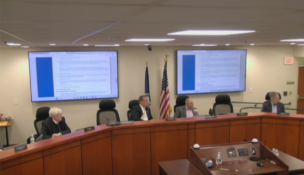Dominion pitches state on $70M battery storage pilot
Cites need for alternatives to in-demand lithium-ion options

Dominion Energy logo

Dominion Energy logo
Dominion pitches state on $70M battery storage pilot
Cites need for alternatives to in-demand lithium-ion options
Dominion Energy Virginia is asking the state to allow it to test two technologies that it says could lengthen the time its batteries can electrify the grid from an average of four hours to longer than four days.
In a 117-page filing made Monday with the State Corporation Commission, Dominion said its Darbytown Storage Pilot Project, based at Henrico County’s Darbytown Power Station, would test two alternatives to in-demand lithium-ion batteries, which are currently used in a range of products from power tools to electric vehicles and by energy storage systems. The project proposes testing an iron-air battery pilot, developed by Somerville, Massachusetts-based Form Energy, and a zinc-hybrid battery developed by New Jersey-based Eos Energy Enterprises. Together, the batteries comprise a total 8.94 megawatts.
Form Energy’s iron-air batteries are based on a process called “reversible rusting.” While discharging, the battery breathes oxygen from the iron, covering iron to rust. While charging, an electrical current converts rust back to iron and the battery breathes out oxygen. The technology has the potential to store energy for as long as 100 hours, according to the SCC filing.
“This technology has the potential to store renewable energy and make it available when and where it is needed, even during multiple days of extreme weather, grid outages, or periods of low renewable generation,” Dominion wrote in its SCC filing.
Eos Energy’s zinc-hybrid batteries can discharge energy across a wide range of operations between three and 12 hours. The systems store electricity by converting zinc dissolved in water to zinc metal deposited on an electrically conductive surface. According to MIT Technology Review, that system makes them more stable so they won’t ignite. The company received a nearly $400 million loan from the U.S. Department of Energy to construct production lines in August.
The proposed project comes as Dominion plans for its 2.6-gigawatt, $9.8 billion Coastal Virginia Offshore Wind project, 27 miles off the coast of Virginia Beach, and expands its solar fleet and battery storage fleet, including the Dulles Solar and Storage Project at Washington Dulles International Airport.
The current batteries in Dominion’s fleet are, on average, limited to four hours or less, the company said. Additionally, lithium-ion batteries have been subject to price volatility and supply chain issues, and competition from the electric vehicle market could make matters worse. Long duration energy storage sources “will be critical to the future of the electric grid where there will be increased intermittent renewable generation,” Dominion said in its filing.
“We are making the grid increasingly clean in Virginia with historic investments in offshore wind and solar,” Ed Baine, president of Dominion Energy Virginia, said in a statement. “With longer-duration batteries in the mix, this project could be a transformational step forward, helping us safely discharge stored energy when it is needed most by our customers.”
In addition to SCC approval, the project requires development plan approval from Henrico County. Dominion said construction would begin by late 2024, and the project would be operational by late 2026. The cost to test the two batteries is estimated at $70.6 million.
Dominion Energy Virginia operates three battery facilities in Powhatan, New Kent and Hanover counties and has battery storage facilities under development in Chesterfield and Sussex Counties, as well as Dulles, in Loudoun County.
-


















